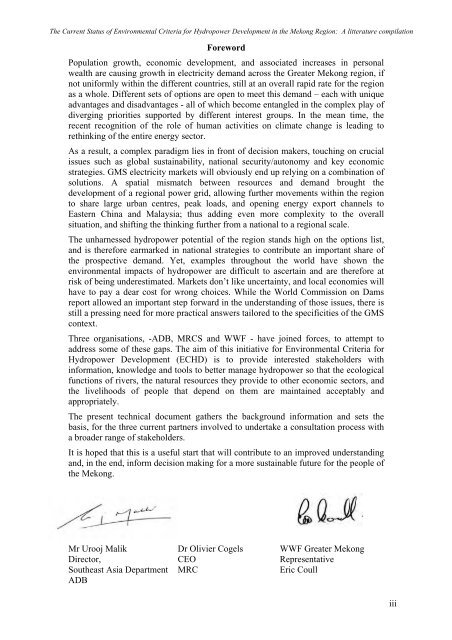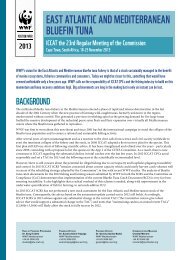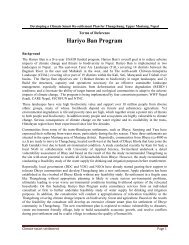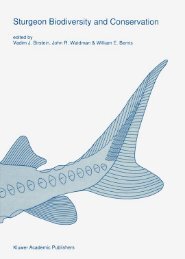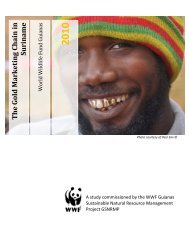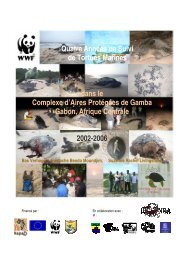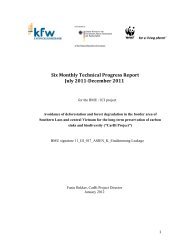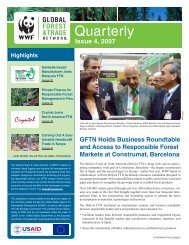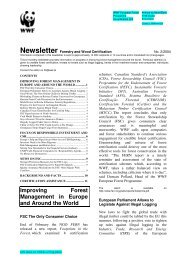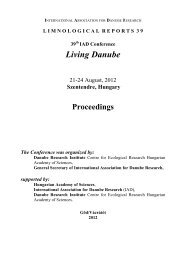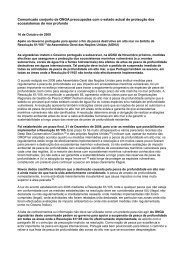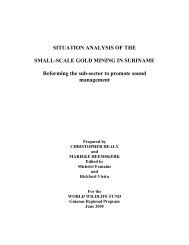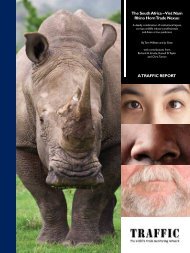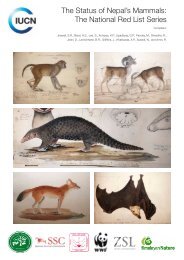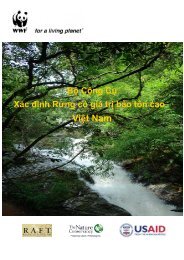Environmental Criteria for Hydropower in the Mekong Region - WWF
Environmental Criteria for Hydropower in the Mekong Region - WWF
Environmental Criteria for Hydropower in the Mekong Region - WWF
You also want an ePaper? Increase the reach of your titles
YUMPU automatically turns print PDFs into web optimized ePapers that Google loves.
The Current Status of <strong>Environmental</strong> <strong>Criteria</strong> <strong>for</strong> <strong>Hydropower</strong> Development <strong>in</strong> <strong>the</strong> <strong>Mekong</strong> <strong>Region</strong>: A litterature compilation<br />
Foreword<br />
Population growth, economic development, and associated <strong>in</strong>creases <strong>in</strong> personal<br />
wealth are caus<strong>in</strong>g growth <strong>in</strong> electricity demand across <strong>the</strong> Greater <strong>Mekong</strong> region, if<br />
not uni<strong>for</strong>mly with<strong>in</strong> <strong>the</strong> different countries, still at an overall rapid rate <strong>for</strong> <strong>the</strong> region<br />
as a whole. Different sets of options are open to meet this demand – each with unique<br />
advantages and disadvantages - all of which become entangled <strong>in</strong> <strong>the</strong> complex play of<br />
diverg<strong>in</strong>g priorities supported by different <strong>in</strong>terest groups. In <strong>the</strong> mean time, <strong>the</strong><br />
recent recognition of <strong>the</strong> role of human activities on climate change is lead<strong>in</strong>g to<br />
reth<strong>in</strong>k<strong>in</strong>g of <strong>the</strong> entire energy sector.<br />
As a result, a complex paradigm lies <strong>in</strong> front of decision makers, touch<strong>in</strong>g on crucial<br />
issues such as global susta<strong>in</strong>ability, national security/autonomy and key economic<br />
strategies. GMS electricity markets will obviously end up rely<strong>in</strong>g on a comb<strong>in</strong>ation of<br />
solutions. A spatial mismatch between resources and demand brought <strong>the</strong><br />
development of a regional power grid, allow<strong>in</strong>g fur<strong>the</strong>r movements with<strong>in</strong> <strong>the</strong> region<br />
to share large urban centres, peak loads, and open<strong>in</strong>g energy export channels to<br />
Eastern Ch<strong>in</strong>a and Malaysia; thus add<strong>in</strong>g even more complexity to <strong>the</strong> overall<br />
situation, and shift<strong>in</strong>g <strong>the</strong> th<strong>in</strong>k<strong>in</strong>g fur<strong>the</strong>r from a national to a regional scale.<br />
The unharnessed hydropower potential of <strong>the</strong> region stands high on <strong>the</strong> options list,<br />
and is <strong>the</strong>re<strong>for</strong>e earmarked <strong>in</strong> national strategies to contribute an important share of<br />
<strong>the</strong> prospective demand. Yet, examples throughout <strong>the</strong> world have shown <strong>the</strong><br />
environmental impacts of hydropower are difficult to ascerta<strong>in</strong> and are <strong>the</strong>re<strong>for</strong>e at<br />
risk of be<strong>in</strong>g underestimated. Markets don’t like uncerta<strong>in</strong>ty, and local economies will<br />
have to pay a dear cost <strong>for</strong> wrong choices. While <strong>the</strong> World Commission on Dams<br />
report allowed an important step <strong>for</strong>ward <strong>in</strong> <strong>the</strong> understand<strong>in</strong>g of those issues, <strong>the</strong>re is<br />
still a press<strong>in</strong>g need <strong>for</strong> more practical answers tailored to <strong>the</strong> specificities of <strong>the</strong> GMS<br />
context.<br />
Three organisations, -ADB, MRCS and <strong>WWF</strong> - have jo<strong>in</strong>ed <strong>for</strong>ces, to attempt to<br />
address some of <strong>the</strong>se gaps. The aim of this <strong>in</strong>itiative <strong>for</strong> <strong>Environmental</strong> <strong>Criteria</strong> <strong>for</strong><br />
<strong>Hydropower</strong> Development (ECHD) is to provide <strong>in</strong>terested stakeholders with<br />
<strong>in</strong><strong>for</strong>mation, knowledge and tools to better manage hydropower so that <strong>the</strong> ecological<br />
functions of rivers, <strong>the</strong> natural resources <strong>the</strong>y provide to o<strong>the</strong>r economic sectors, and<br />
<strong>the</strong> livelihoods of people that depend on <strong>the</strong>m are ma<strong>in</strong>ta<strong>in</strong>ed acceptably and<br />
appropriately.<br />
The present technical document ga<strong>the</strong>rs <strong>the</strong> background <strong>in</strong><strong>for</strong>mation and sets <strong>the</strong><br />
basis, <strong>for</strong> <strong>the</strong> three current partners <strong>in</strong>volved to undertake a consultation process with<br />
a broader range of stakeholders.<br />
It is hoped that this is a useful start that will contribute to an improved understand<strong>in</strong>g<br />
and, <strong>in</strong> <strong>the</strong> end, <strong>in</strong><strong>for</strong>m decision mak<strong>in</strong>g <strong>for</strong> a more susta<strong>in</strong>able future <strong>for</strong> <strong>the</strong> people of<br />
<strong>the</strong> <strong>Mekong</strong>.<br />
Mr Urooj Malik<br />
Director,<br />
Sou<strong>the</strong>ast Asia Department<br />
ADB<br />
Dr Olivier Cogels<br />
CEO<br />
MRC<br />
<strong>WWF</strong> Greater <strong>Mekong</strong><br />
Representative<br />
Eric Coull<br />
iii


